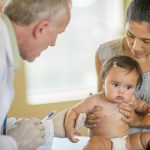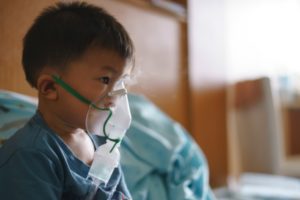RSV on the rise: Symptoms, treatment and prevention
In addition to COVID and the flu, doctors caution that parents should be on the lookout for another virus this season: the respiratory syncytial virus, more commonly known as RSV. While RSV can impact both adults and children, the symptoms are more severe in kids and the numbers are rising early this year.
“In the continental US, RSV is typically a wintertime virus. The COVID-19 pandemic affected transmission of our seasonal viral respiratory infections and we saw virtually no RSV infections last winter. RSV infections began to increase this spring as restrictions were loosening, and we are now seeing numbers of RSV typical to winter,” explained Laura Lynn Bode, DO.
RSV season is typically from November-May with case numbers peaking during the winter months in January or February. Most children will contract RSV at least once by the time they are three years old, and most cases clear up on their own within five to seven days. However, there are some severe symptoms that parents should be on the lookout for.
Warning signs
Infections will begin with bronchiolitis, a lung infection, which typically includes congestion, a runny nose, and sneezing. This can progress into coughing and increased work of breathing, which leads to children using more muscles and energy to breathe than they normally do.
“A parent should take their child to the emergency department instead of waiting to see their PCP if the child has significant increase work of breathing,” said Caleb Hentges, DO. “Parents can tell this by watching their child as they breathe; look at their nostrils to see if they are flaring as the child breathes. Also, take their shirt off and watch their chest and belly as they breathe. If you see the muscles around the collarbones and ribs pulling in our they are using their belly a lot to breathe, these are signs of significantly increased work of breathing.”
Dr. Hentges said to also be on the lookout for children not drinking, as dehydration and lack of nutrition can quickly become a problem, especially for babies. Children with blue-grayish discoloration around the mouth and newborns with a fever, who appear ill, or have abnormal pauses in breath also need immediate medical attention, Dr. Bode added.
While RSV can impact people of all ages, Dr. Bode said that premature infants, very young infants, children under two years old with chronic lung disease or serious heart conditions, and individuals with problems with immunity are most at risk for a severe RSV infection.
Diagnosis and treatment
Those infected with RSV can typically be clinically diagnosed without a test. Nasal swabs, similar to those used to diagnose influenza and COVID-19, can also be used to detect infection, particularly for those who may be at high risk. Unfortunately, like other viral infections, RSV cannot be treated with medications. However, there are ways parents can help children.
“Infants and children who can’t blow their noses yet may benefit from nasal suctioning and saline spray,” said Dr. Bode. “Feeding and appetite may be affected, so offer plenty of fluids, sometimes in small amounts, to prevent dehydration.”
Tylenol can help treat any associated fevers, Dr. Hentges added. Most children infected with RSV do not need to be hospitalized. However, in hospitalization cases, children will be given IV fluids, receive nasal suctioning, be given supplemental oxygen, and have chest physical therapy to help clear the massive amounts of secretions, explained Dr. Hentges.
Prevention
Even though RSV is a common illness, there are steps parents can take to help prevent infections.
“Parents can help prevent their kids from getting an RSV infection by encouraging their kids to frequently wash their hands, avoid touching their face with unwashed hands, cover their coughs and sneezes, avoid contact with sick people, clean and disinfect surfaces, and stay home when they’re sick,” said Dr. Hentges.
It is also recommended to keep young babies away from anyone who is sick with a cold, fever, or runny nose. Additionally, according to Dr. Bode, certain infants who are at risk for severe disease can get a monthly injection of RSV antibodies to prevent serious illness.
Currently, the long-term effects of RSV are not exactly known. Most commonly, recurrent wheezing and an increased risk of developing asthma later in life are associated with an RSV infection.
“It is unclear if the viral infections lead to the development of asthma, or if the predisposition to asthma leads to being more severely affected by viral respiratory infections,” said Dr. Bode.
Staying vigilant and taking safety measures will help prevent the spread of RSV this season.

